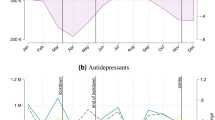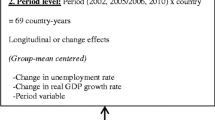Abstract
Our aim in this paper is to understand the impact of macroeconomic fluctuations on mental health and psychotropic medicine consumption. In order to do that we exploit differences in the fluctuations of business cycle conditions across regional units in Catalonia. Our findings suggest that, in general, economic fluctuations at the local level had no significant effect on the consumption of psychotropic medicines. However, we show that a deterioration in local labour market conditions is associated with a reduction in the consumption of anxiolytics medicines. We also report an increase in the consumption of anxiolytics in regions with a softer deterioration in the economic situation. Although we report mild improvements in both mental and physical health for some sub-groups of the population, we also find significant reductions on the probability of sleeping 6 h or more. Thus, these elements point towards potential negative effects of local labour market conditions on health in the medium/long term.

Source: Catalan Institute of Statistics (IDESCAT)
Similar content being viewed by others
Notes
It should be noticed that, in Spain, mental healthcare is an integral part of the general healthcare with universal coverage funded by taxation (Salvador-Carulla et al. 2006). Moreover, general practitioner doctor can offer psychotropic treatments as part of their service, especially in patients who suffer anxiety or depression.
See further information in: https://www.aemps.gob.es/.
Individuals cannot be followed over time.
Except for 2010 in which the survey is collected only once.
We use 6 h per day as a measured of enough sleep because of, according to Möller-Levet et al. (2013), sleeping less than 6 h can have a broad negative impact on long-term well-being.
It should be noted that the most disaggregated regional variable provided by ESCA is the Territorial Health Government (GTS), which its main aim is to promote the interaction between Government, Administration and citizens, and is composed by 37 health regions. However, we used 31 regions as some of them are merger in order to match with their specifically unemployment rate. For instance, there are 4 GTS for the area of Barcelona.
Figure 2 plots the evolution of the unemployment rate in Catalonia and in Spain and we can see that the evolution is very similar. Furthermore, Fig. 3 plots the evolution of the unemployment rate in the four provinces in Catalonia. As it can be seen, there are regional differences in business cycle conditions within Catalonia.
We define this variable as a dummy variable that takes value 1 if the region experiences an increase in the unemployment rate above the mean during our sample period and zero otherwise.
References
Arroyo Borrell, E. (2016). Health and economic conditions: evidence from individual-level data.
Ásgeirsdóttir, T. L., Corman, H., Noonan, K., & Reichman, N. E. (2016). Lifecycle effects of a recession on health behaviors: Boom, bust, and recovery in Iceland. Economics & Human Biology, 20, 90–107.
Astell-Burt, T., & Feng, X. (2013). Health and the 2008 economic recession: evidence from the United Kingdom. PLoS One, 8(2), e56674.
Barcelo, M. A., Coll-Negre, M., Coll-de-Tuero, G., & Saez, M. (2016). Effects of the financial crisis on psychotropic drug consumption in a cohort from a semi-urban region in Catalonia, Spain. PloS One, 11(2), e0148594.
Bartoll, X., Palencia, L., Malmusi, D., Suhrcke, M., & Borrell, C. (2013). The evolution of mental health in Spain during the economic crisis. The European Journal of Public Health, 24(3), 415–418.
Bassols, N. M., & Castelló, J. V. (2016). Effects of the great recession on drugs consumption in Spain. Economics & Human Biology, 22, 103–116.
Burgard, S. A., Brand, J. E., & House, J. S. (2007). Toward a better estimation of the effect of job loss on health. Journal of Health and Social Behavior, 48(4), 369–384.
Burgard, S. A., Brand, J. E., & House, J. S. (2009). Perceived job insecurity and worker health in the United States. Social Science and Medicine, 69(5), 777–785.
Carpenter, C. S., McClellan, C. B., & Rees, D. I. (2017). Economic conditions, illicit drug use, and substance use disorders in the United States. Journal of Health Economics, 52, 63–73.
Colell, E., Sánchez-Niubò, A., Delclos, G. L., Benavides, F. G., & Domingo-Salvany, A. (2015). Economic crisis and changes in drug use in the Spanish economically active population. Addiction, 110(7), 1129–1137.
(ESCA) Enquesta de Salut de Catalunya. (2010–2015). Departament de Salut. Generalitat de Catalunya. 2018.
Gili, M., García, J. C., & Roca, M. (2014). Economic crisis and mental health. SESPAS report 2014. Gaceta Sanitaria, 28, 104–108.
Gili, M., Roca, M., Basu, S., McKee, M., & Stuckler, D. (2012). The mental health risks of economic crisis in Spain: Evidence from primary care centres, 2006 and 2010. The European Journal of Public Health, 23(1), 103–108.
Goldman-Mellor, S. J., Saxton, K. B., & Catalano, R. C. (2010). Economic contraction and mental health: A review of the evidence, 1990–2009. International Journal of Mental Health, 39(2), 6–31.
Mckenzie, S. K., Gunasekara, F. I., Richardson, K., & Carter, K. (2014). Do changes in socioeconomic factors lead to changes in mental health? Findings from three waves of a population based panel study. Journal of Epidemiology and Community Health, 68(3), 253–260.
Möller-Levet, C. S., Archer, S. N., Bucca, G., Laing, E. E., Slak, A., Kabiljo, R., et al. (2013). Effects of insufficient sleep on circadian rhythmicity and expression amplitude of the human blood transcriptome. Proceedings of the National Academy of Sciences, 110(12), E1132–E1141.
Rivera, B., Casal, B., & Currais, L. (2017). Crisis, suicide and labour productivity losses in Spain. The European Journal of Health Economics, 18(1), 83–96.
Ruhm, C. (2000). Are recessions good for your health? The Quarterly Journal of Economics, 115(2), 617–650.
Ruhm, C., 2005. Healthy living in hard times. Journal of Health Economics; vol. 24 (2), pp. 341-363.
Ruhm, C. (2015). Recessions, healthy no more? Journal of Health Economics, 42, 17–28.
Salvador-Carulla, L., Garrido, M., McDaid, D., & Haro, J. M. (2006). Financing mental health care in Spain: Context and critical issues. The European Journal of Psychiatry, 20(1), 29–44.
Simon, K. (2017). Macroeconomic Conditions and Opioid Abuse Alex Hollingsworth Christopher J. Ruhm.
Urbanos-Garrido, R. M., & Lopez-Valcarcel, B. G. (2015). The influence of the economic crisis on the association between unemployment and health: an empirical analysis for Spain. The European Journal of Health Economics, 16(2), 175–184.
Wang, H., Wang, C., & Halliday, T. J. (2018). Health and health inequality during the great recession: Evidence from the PSID. Economics & Human Biology, 29, 17–30.
World Health Organization. (2001). The world health report 2001: Mental health: new understanding, new hope. Geneva: World Health Organization.
Author information
Authors and Affiliations
Corresponding author
Additional information
Publisher's Note
Springer Nature remains neutral with regard to jurisdictional claims in published maps and institutional affiliations.
Appendix
Appendix
Rights and permissions
About this article
Cite this article
Martínez-Jiménez, M., Vall Castelló, J. Effects of macroeconomic fluctuations on mental health and psychotropic medicine consumption. Int J Health Econ Manag. 20, 277–297 (2020). https://doi.org/10.1007/s10754-020-09281-3
Received:
Accepted:
Published:
Issue Date:
DOI: https://doi.org/10.1007/s10754-020-09281-3







